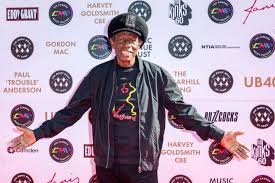
Celebrating a Musical Legacy: Eddy Grant’s Enduring Influence
Eddy Grant, a trailblazing musician, activist, and record label owner, has officially released his groundbreaking album Killer On The Rampage on digital platforms for the first time. This milestone comes 42 years after the album’s original debut, marking a significant moment for fans worldwide and a new generation eager to experience Grant’s genre-defying sound.
As one of the most influential black British artists, Grant’s contributions to music span nearly six decades. With 15 albums and five UK Top 10 singles to his name, his impact on the global music scene is undeniable. His distinctive style—an electrifying fusion of reggae, rock, funk, disco, and new wave—has resonated across generations, making Killer On The Rampage a seminal work in contemporary music history.
Killer On The Rampage: A Landmark Album Revisited
Originally released in late 1982, Killer On The Rampage became a commercial and critical success, securing Top 10 spots in both the UK and US charts. The album featured the timeless classics Electric Avenue—a politically charged anthem inspired by the Brixton riots—and I Don’t Wanna Dance, which topped the UK charts, solidifying Grant’s status as a transatlantic pop icon.
Now available on all major streaming services, this re-release grants listeners access to a rare alternative cover version, adding an exclusive layer to the experience. The album’s availability also addresses a long-standing issue—prior to this, Grant’s extensive catalog had largely been absent from digital platforms, with only unofficial bootlegs circulating online.
The Story Behind the Album’s Creation
Grant’s journey to creating Killer On The Rampage was anything but conventional. Following the global success of Do You Feel My Love and the album Can’t Get Enough, he made the pivotal decision to leave the UK. During his flight from London to Barbados, Grant’s luggage—containing completed songs for his next album—was lost permanently. This forced him to start from scratch, writing entirely new material while simultaneously building a recording studio and renovating a historic house.
This adversity became the foundation for what would become Killer On The Rampage. The struggle, much like grapes grown in harsh conditions producing the finest wine, resulted in an album of unparalleled depth and artistic integrity.
Notable Tracks and Their Impact
Electric Avenue: A Protest Anthem
One of Grant’s most iconic tracks, Electric Avenue is a high-energy song with a deeper meaning. Named after the Brixton street that became synonymous with social unrest, the song captures the tensions of the early 1980s, addressing issues of economic disparity and racial injustice. Decades later, its message remains strikingly relevant.
I Don’t Wanna Dance: A Song of Farewell
This reggae-pop masterpiece reflects Grant’s disillusionment with Britain’s social climate at the time. It became a UK No. 1 hit, demonstrating his ability to blend infectious melodies with profound lyrical storytelling.
War Party and Funky Rock ‘N’ Roll: Fusion at Its Best
Throughout the album, Grant seamlessly integrates various musical styles, as seen in War Party, which carries a powerful socio-political message, and Funky Rock ‘N’ Roll, a track that exemplifies his genre-defying approach to music.
The Influence of Killer On The Rampage on Global Music
The release of Killer On The Rampage was a defining moment in pop history. The album not only showcased Grant’s multi-instrumental talents—he played nearly every instrument on the record—but also cemented his reputation as an uncompromising artist with a powerful voice.
His work has been widely covered and remixed by artists across genres. Electric Avenue alone has been featured in commercials, films, TV shows, video games, and countless remix versions, breathing new life into Grant’s legacy with each iteration.
Expanding His Digital Presence
This digital re-release marks just the beginning. Grant has announced plans to gradually make his entire 15-album catalog available for streaming, beginning with his debut solo album Hello Africa (1975). This effort ensures that his music will remain accessible to future generations, preserving his artistic contributions in the digital age.
Eddy Grant: A Musical Pioneer
Born in Plaisance, Guyana, in 1948, Grant moved to London at the age of 12. His musical journey began as a founding member of The Equals, the first multi-racial band to achieve international success. Their hit Baby, Come Back became a UK No. 1, and other tracks like Police On My Back and Black Skinned Blue Eyed Boys carried powerful messages on race and unity.
In 1970, Grant took control of his artistic direction by launching his own label, Torpedo. By 1979, he released Walking On Sunshine, a dancefloor staple later popularized by Rockers Revenge. His impact on Caribbean music grew as he collaborated with legends like Lord Kitchener and Mighty Sparrow.
Grant’s career continued to evolve, leading to the creation of Ringbang, a musical philosophy that distinguished itself from soca and calypso. His 1988 hit Gimme Hope Jo’anna became an anthem for anti-apartheid activism, demonstrating his ongoing commitment to social justice through music.
The Enduring Legacy of Killer On The Rampage
With Killer On The Rampage now widely available, Eddy Grant’s legacy continues to inspire. His ability to merge powerful messages with infectious rhythms makes his music as relevant today as it was four decades ago. This digital release allows both longtime fans and new listeners to experience one of the most significant albums in pop and reggae history.
As streaming platforms breathe new life into Grant’s work, his influence remains undeniable. Whether through his innovative sounds, political messages, or fearless artistic choices, Eddy Grant has secured his place as a pioneer whose music transcends time.